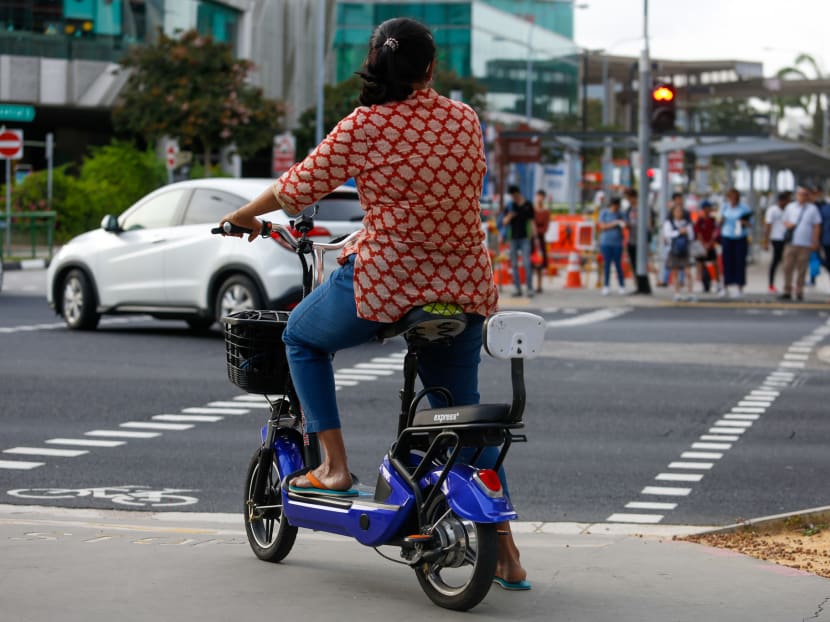All motorised mobility devices banned on footpaths from April: Govt
SINGAPORE — A ban on riding electric scooters on footpaths, which came into effect in November, will be extended to all other motorised mobility devices from April.

Apart from electric scooters, devices including electric skateboards, hoverboards and unicycles will be barred from footpaths from April.
SINGAPORE — A ban on riding electric scooters on footpaths, which came into effect in November, will be extended to all other motorised mobility devices from April.
This means devices such as electric skateboards, hoverboards and unicycles will also be barred from footpaths.
Dr Janil Puthucheary, Senior Minister of State for Transport, announced the move in Parliament on Tuesday (Feb 4) during debates on changes to the Active Mobility Act and on the Shared Mobility Enterprises (Control and Licensing) Bill, which introduces new rules for shared-device operators.
He revealed that since electric scooters were banned from footpaths in November last year, accidents on footpaths that involve mobility vehicles have tumbled by 52 per cent.

Separately, a minimum age for electric scooter riders will kick in later this year, and users of electric scooters and electric bicycles must take a theory test from the first half of next year. These rules were among recommendations made in September last year by the Active Mobility Advisory Panel after the first fatality from an electric scooter collision caused a public uproar.
There will also be tougher penalties for offences committed by riders and retailers including speeding on public paths, and displaying and advertising non-compliant devices.
TODAY outlines the main changes that will take effect after the Bills are enacted into law:
BAN EXPANDED TO ALL MOTORISED MOBILITY DEVICES
From April, Singapore’s footpaths will be off-limits to all motorised mobility vehicles.
These devices will be allowed only on bicycle paths and park connectors.
On Nov 5 last year, the authorities first barred electric scooters from footpaths after a spate of accidents thrust safety concerns to the fore.
Since Jan 1, when authorities began strictly enforcing the ban after giving riders some leeway by issuing advisories, more than 130 electric scooter users have been caught for violating the rule.
The ban does not apply to personal mobility aids for the less mobile such as electric wheelchairs, which continue to be allowed on footpaths.
Penalty: Offenders who ride motorised vehicles on footpaths for the first time could be fined S$2,000, jailed for three months, or both. Repeat offenders could face a S$5,000 fine, six months behind bars, or both.
AT LEAST 16 YEARS OLD TO RIDE E-SCOOTER
From the second half of this year, riders of electric scooters must be at least 16 years old. Right now, users of electric bicycles are already subject to the same minimum riding age.
An exception will be granted for users below 16 years old if they ride under the supervision of an adult who is at least 21. This is to allow family bonding activities in line with the Active Mobility Advisory Panel’s recommendation. Authorities will publish guidelines for supervisors.
Penalty: Underaged riders could be fined S$1,000, jailed for three months, or both. Repeat offenders could receive a S$2,000 fine, be jailed for six months, or both.
ONLINE TEST FOR E-SCOOTER AND E-BICYCLE RIDERS
From the first half of next year, all users of electric scooters and electric bicycles — which are allowed on roads — must pass an online theory test before they can ride their vehicles on public paths or roads.
The aim of the test is to improve awareness among riders of the regulations and expected safe riding behaviour, said Dr Puthucheary, adding that those who pass will receive a certificate.
The Government, he noted, will have the flexibility to introduce other tests, such as practical riding tests, in the future if necessary.
Authorities are drawing up the curriculum for the test.
Penalty: First-time offenders who ride their devices on public paths without passing the test could receive a S$2,000 fine, a six-month jail term, or both. Those who ride on the roads without passing the test could be fined S$10,000, jailed for three years, or both.
MANDATORY E-SCOOTER INSPECTION
The Government announced last year that all e-scooters must undergo a mandatory inspection every two years from April at one of nine inspection centres islandwide. This will allow authorities to clamp down on illegally modified devices and ensure compliance with the rules.
Penalty: From April, failure to send a device for inspection will be an offence that can draw a S$1,000 fine, three months behind bars, or both, for first-time offenders. Repeat offenders could be fined S$2,000, jailed for six months, or both.
Retailers will also be required to send electric scooters for inspection before putting them on sale.
Penalty: Selling an uncertified vehicle for the first time could carry a S$20,000 fine, a 24-month jail term, or both.
WEEDING OUT ILLEGAL MODIFICATIONS
The authorities will also be given more teeth to crack down on illegal modification, when the rules are broadened from April to cover users who modify their own vehicles and those who do so for others without compensation.
Before the amendments to the Act, it was illegal for people to alter a device that belongs to another person in the course of business — a rule that remains in place.
Penalty: First-time offenders could be fined S$5,000, jailed for three months, or both. For subsequent offences, culprits could be fined S$10,000, jailed for six months, or both.
RESTRICTED USE OF MOBILE DEVICES
From the second half of this year, users of mobility vehicles will also not be permitted to hold and use mobile devices, including phones and tablets, unless these are mounted, or used in a hands-free manner or when the vehicle is stationary.
Penalty: Users could be fined S$1,000, jailed for three months, or both. Repeat offenders could face tougher action: A S$2,000 fine, six months behind bars, or both.
COMPULSORY THIRD-PARTY LIABILITY INSURANCE
From the second half of this year, businesses must ensure their riders who use mobility vehicles for work have third-party liability insurance, which allows victims to file claims for damages.
These businesses include food-delivery firms, such as GrabFood and Foodpanda, and those offering courier services. Either businesses or riders may buy the insurance.
Dr Puthucheary said that the authorities are working with the Active Mobility Advisory Panel and the insurance sector to study the best way to extend these requirements to individual riders.
Penalty: Individuals who flout this rule could be fined S$10,000, jailed for 12 months, or both. Non-individuals, such as corporations, could face a S$20,000 fine.
STIFFER PENALTIES FOR RETAILERS
Retailers will also face heavier punishment for offences such as displaying or advertising non-compliant mobility vehicles.
Previously, for these offences, first-time offenders could be fined S$1,000, jailed for three months, or both. The maximum fine will climb to S$10,000 and the jail term raised to 12 months. Corporate bodies convicted of the offences could be fined S$20,000 if it is their first offence, or S$40,000 for subsequent offences.
Dr Puthucheary said that there were 28 instances in which retailers were caught for various offences last year, including displaying and advertising non-compliant devices.
BEEFING UP REGULATIONS FOR OPERATORS OF SHARED VEHICLES
In the meantime, operators of shared devices will assume expanded responsibility for the safe operation of their devices and the safety of riders under the Shared Mobility Enterprises (Control and Licensing) Bill.
The Bill sets out a new legislative framework that enlarges the scope of the present licensing regime for operators of shared bicycles and mobility devices. It will replace the device-sharing licensing regime under the Parking Places Act, which focused on tackling indiscriminate parking, particularly by users of shared bicycles.
There will be two licence types under the proposed Act: “Regular” and “class” licences.
Regular licences: Regular licences will apply to firms that operate shared dockless motorised and non-motorised devices used on public paths — such as bicycle-sharing operators.
Operators must apply for the licences, which take effect from the second half of this year.
They will be subject to requirements governing areas such as safety. These include banning users who had committed serious offences on shared devices, such as reckless riding. Operators must also ensure that their users have third-party liability insurance.
Dr Puthucheary said that as bicycles are non-motorised and pose a smaller safety concern, authorities will subject bicycle-sharing operators only to requirements governing parking for a start — no different from the present regime.
As for shared motorised devices, they are prohibited in Singapore under a safety directive. Authorities have no plans to reopen licence applications for now.
Dr Puthucheary said that the authorities would continue to assess safety on public paths and the industry’s readiness when assessing licence applications.
“Appropriate safety requirements will be imposed if licences are granted for this group, which may include ensuring that the motorised devices are equipped to accurately identify the device location and travelling speed, and ensuring that the devices only operate in limited geographical spaces specified by the Land Transport Authority (LTA).”
Class licences: Class licences are for operators of docked motorised devices — which number fewer than 10 here — and businesses that hire out vehicles to employees as an employment benefit or for official duties.
Authorities will employ a “lighter-touch approach” for such operators because they use docking equipment and cause fewer parking headaches. They will be subject to fewer requirements, including installing speedometers. Operators must also ensure that users are covered by third-party liability insurance.
Licencees, though, need not apply for the licences, but must register with the LTA soon after they start operations.
For starters, operators of shared mobility aids and docked devices that are not motorised will be excluded from this regime, LTA said.











